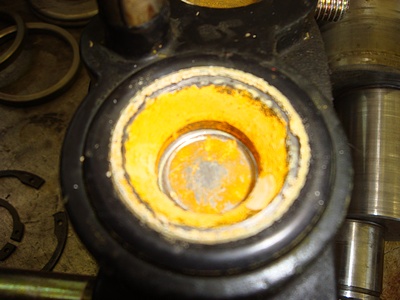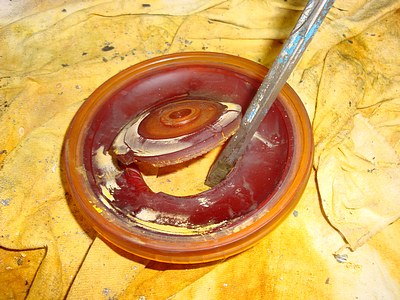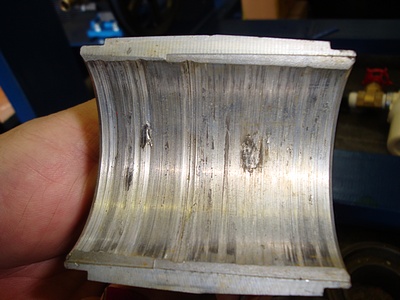Five Findings from a Filthy Filter Photo
Posted by Andrew Greess on Feb 27, 2020
There are at least 5 important lessons we can learn from this one photo.

This was is screen from a weed control power sprayer filter brought in by a tech for service. Tech said his pump stopped pumping, oh, and by the way, “I haven’t been able to check the filter for a few weeks because it is on too tight”. The clogged filter meant the pump was run dry and totally destroyed. This cost the company over $1000 in repairs, not to mention wages paid to employee sitting waiting for repair, cancelled appointments, etc.
Here are 5 important lessons to be learned from this photo.
1. Clean your equipment, including cleaning your filter
One of the most important points with any pest control equipment or landscape power sprayers is clean it out. We estimate that at least half the problems we see in our pest equipment repair shop are caused by this very problem.
On your pest control power sprayer, check your filter every day. Clean out your tan periodically. Almost any piece of equipment you rely on to do your job will work better if periodically cleaned.
2. Inspect your equipment
If you are the manager or owner of a company with multiple techs and vehicles, it is critical that you inspect your vehicles and pest control equipment. As Ronald Reagan said about the Soviet Union many years ago, “Trust but verify”.
You cannot assume that your techs are doing everything you want them to. If they did, our pest control equipment repair shop wouldn’t be as busy as we are.
There are a couple of ways to do it. You need to find the way that works for you. A quick visual inspection can be valuable. A periodic detailed inspection of landscape power sprayers can also be valuable, though it will take more time.
There is a middle ground: pick a couple of key indicators and look for those. Here is an article I wrote for Pest Management Magazine about how the rock band Van Halen does it: https://www.mypmp.net/2012/10/04/what-pmps-can-le...
3. Train & Retrain your Techs
Just because you trained Joe on day 1 doesn’t mean he is still doing things the way you want him to. Often, techs find shortcuts, and often shortcuts can cost the company money.
A couple of years ago I did some training for a medium-sized pest control company. I made the point that it is important to check and clean your filter every day. One of the techs asked, “where is the filter”? I answered his question and thanked him for having the guts to ask the question in a room full of people. After the training, the supervisor came up to me and said, “I showed him where the filter was on his first day of work!”
This really brought the point home to me. If it is important, you many need to tell someone more than once.
I would go a step further. Don’t just tell him (or her) what to do, explain why they need to do it. In the example at the top of this post, had the tech realized how important it was to check his filter, he might not have cost his company so much money.
4. Encourage Problem Reporting
If this tech had told his boss a couple of weeks ago that he couldn’t open the filter, the boss would have dealt with the problem and saved lots of money, downtime and stress.
We’re constantly amazed at the equipment problems spray techs tolerate. They’ll continue to use leaking pumps, hose and backpacks. Spray equipment problems always worsen and are more expensive to fix. Deal with problems and encourage employees to report problems so you can take the appropriate action.
5. Keep Important Replacement Parts on Hand
When it comes to pest or landscape routes, productivity is the name of the game. Downtime kills productivity, profits and customer satisfaction.
Many repairs are quite simple and can be done by you.
Keep these parts on hand to minimize downtime and missed appointments. Think of parts in 2 categories: vehicle and office. Lots of common equipment issues can be fixed easily in the field. These parts should be kept in the vehicle to save time. For example, on the hand sprayer, tips and tank gaskets wear out regularly, and can be easily replaced in the field. Conversely, the valve cable that runs through the hand sprayer wand requires wrenches and more time, so this replacement part should be kept at the office.
In this specific example, an extra filter and filter gasket might have come in pretty handy.
Here are so additional photos that show the impact of this filter.
#1: Pump valve clogged with chemical

#2. Clogged filter means water can't get to pump. Pump runs hot, diaphragms burst.

#3. When diaphragms burst, all the oil runs out of the pump.
Running the diaphragm pump without oil is like running your car without oil. Total destruction. This connecting rod should be perfectly smooth. It is grooved out and has metal from other pump parts melted to it. Ouch! Expensive!


